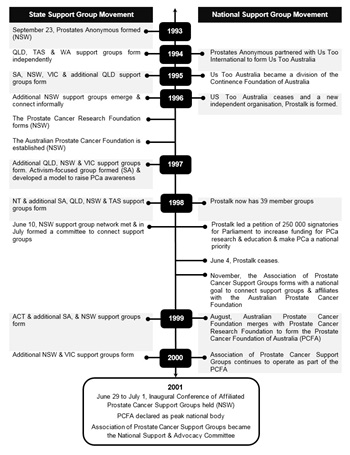14 March 2016
By: Associate Professor Anthony Lowe, Chief Executive Officer
14 March 2016 marks the 20th anniversary of the formation of Prostate Cancer Foundation of Australia. This anniversary is hardly a cause for celebration as after 20 years of hard work 20,000 Australian men are diagnosed with, and 3,300 die of, prostate cancer annually. Equally importantly, some 200,000 Australian men and their families are living with the disease, and in far too many cases living with a psychosocial and quality of life burden that includes heightened psychological distress; an increase risk of suicide; and long term quality of life concerns, especially in the area of sexual well-being.
Notwithstanding this, much has been achieved over the past twenty years. Back in 1996 there were no prostate cancer specific cancer control or support agencies and information and advice for prostate cancer survivors and their partners about treatment side effects and management strategies was largely non-existent. In response ordinary men and women affected by the disease formed a grass roots health activist movement, founded on the simple principle of ‘mates helping mates’, to address these issues.
Australian support groups began to emerge in 1993, first in NSW with the formation of Prostates Anonymous, a self-help group. In the following years further groups emerged independently of each other throughout the country. Many of these groups were initiated independently of health services while others had informal partnerships with local health professionals who supported meetings with venues and occasional guest speakers. During these formative years some groups worked to raise public awareness about prostate cancer and initiated informal connections with other support groups or health agencies.
Independent advocates within these groups were important in driving towards a national collective. For example, in NSW the leader of Prostates Anonymous, Peter Schade, partnered with Us Too International to form Us Too Australia, that later merged as a division of the Continence Foundation of Australia in 1995, and in 1996 changed form again to become Prostalk, becoming now independent of these earlier affiliations. However, Prostalk was highly defined by its leader and so ended in 1998 when Peter died.
In this same period two organisations emerged in NSW which played a pivotal role in the national movement. In 1994 the television personality, Roger Climpson OAM, a member of the Rotary Club of Lane Cove, was successfully treated for prostate cancer. Roger was concerned by the confusing information available to him and by the apparent lack of research into the disease being carried out in Australia. In 1996 he persuaded fellow club members to join him in forming Prostate Cancer Research Foundation (PCRF) to raise funds for research.
Then in 1998 a committee of support group representatives from the greater Sydney and Newcastle area formed the Association of Prostate Cancer Support Groups (APCSG) that had a state focus but hoped to connect support groups nationally.
APCSG led by Max Gardner AM moved to affiliate with PCRF. As this occurred another NSW based fundraising group, the Australian Prostate Cancer Foundation (APCF) also emerged. In 1999 PCRF, APCF and APSCG merged under PCRF's corporate structure and the new name Prostate Cancer Foundation of Australia was chosen to reflect the organisation’s widened agenda. Within this the APSCG maintained its own identity and autonomy.
It was not until 2001 that the relationship between the national support group movement and PCFA was clearly and formally established. At this point there were 40 support groups across the country. The key pivotal moment was an Inaugural Conference of Affiliated Prostate Cancer Support Groups (organised by PCFA) that provided the first national forum for support group representatives across Australia to connect and devise strategies to address priority issues for prostate cancer survivors and advance the broader movement. At this conference the support groups declared PCFA as the peak national body for prostate cancer and the Association of Prostate Cancer Support Groups became the Support and Advocacy Committee (now known as the National Support Groups Committee) within PCFA's governance structure.
Max Gardner, who was a key figure in the movement, died in 2004. Over the next decade more support groups formed under the umbrella of PCFA and today there are approximately 170 prostate cancer support groups affiliated with PCFA, including groups for partners and carers; gay and bisexual men; men with advanced prostate cancer; men from culturally and linguistically diverse communities; younger men and sport and fitness groups.
To this day PCFA remains a broad based community organisation and the peak national body for prostate cancer in Australia. We are dedicated to reducing the impact of prostate cancer on Australian men, their partners and families, recognising the diversity of the Australian community.
We do this by:
- Promoting and funding world leading, innovative research into prostate cancer
- Implementing awareness and advocacy campaigns and education programs for the Australian Community, health professionals and Government
- Supporting men and their families affected by prostate cancer through evidence-based information and resources, support groups and Prostate Cancer Specialist Nurses.
PCFA relies on the generosity of individuals, the community and partnerships to carry out our essential work.
Whilst there is still much to be accomplished, today - 14 March 2016 - we celebrate the achievements of the pioneers of the prostate cancer movement.
The timeline for the prostate cancer support group movement up to formal national affiliation with PCFA (1993-2001).

